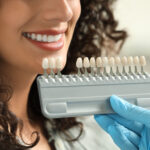Is There a Connection?
With a lot of things, the terms “bad” and “good” are pretty subjective. But when it comes to our breath, we all know “bad” breath is really bad. What you last ate contributes to the breath scent, as do your oral hygiene habits. Overall health is also an important factor, since sinus issues or chronic digestive problems, like acid reflux, contribute to halitosis, the dental term for bad breath. Scientific researchers have also found that otherwise healthy individuals may suffer from halitosis simply because of a certain kind of bacteria.
Bacteria Abounds
It’s important to remember that we all have bacteria in our mouth, some beneficial and others harmful. Oral bacteria are essentially separated into two types: gram-positive bacteria have no fatty outer layer and causes dental plaque; gram-negative bacteria have a fatty outer layer and produce noxious gas. These are both detrimental bacteria, of course, and popping mints won’t eliminate them. Only a strong antibacterial mouthwash will provide good breath results. However, some patients may be wondering, “Is it safe to use antibiotic mouth rinses daily?”
Where Are the “Good” Bacteria?
Drowning bad bacteria with mouthwash seems like a great idea if you have persistent bad breath, but doing so may also be killing off a “third” type of bacteria — the kind you want in your mouth. Scientific American states: “Fresh breath reflects a healthy mouth, which is not necessarily one that lacks ‘bad’ bacteria…but rather one in which overlapping bacterial colonies hold one another in check.” Bacteria might be microscopic, but your mouth has room for only so many of them, either good or bad. If you have more “helpful” bacteria in your mouth, decay and stink-causing bacteria find it more difficult to make a home on your teeth and under your gums.
To take advantage of “good” bacteria, ongoing research is studying probiotics containing a gram-positive bacterial strain known as S. salivarius K12. Volunteers in New Zealand and Australia swished with an antibacterial mouthwash and then sucked on lozenges containing K12. Seven and then fourteen days later, the K12 volunteers had better smelling breath. It seems the beneficial bacteria created a better bacterial ratio in the mouths of the volunteers. Applied and Environmental Microbiology also states that K12 is “unlikely to cause disease in healthy humans.” Other studies show promise in the use of mouthwashes containing peptides. Peptides evidently encourage a proper oral balance by encouraging “good” bacteria to be the prevalent type in your mouth.
What Do I Do Right Now?
Unfortunately, these studies are in their initial stages, so you will not find “fresh breath” bacterial boosters at any local Placerville stores or pharmacies. So what can you do now to keep your breath fresh?
- See your dentist at the Placerville Dental Group at least twice a year;
- Brush twice a day for two minutes each time;
- Floss every day;
- Don’t overuse antibacterial mouthwashes (there is too much of a good thing);
- Maintain your general health, especially in your sinuses during allergy season;
- Eat well to support digestive health;
- Avoid foods that lead to bad breath.
Visit the Placerville Dental Group if following these steps doesn’t freshen your breath. You likely have a gum disease problem that we can swiftly fix. Until dental research makes it possible to be a lozenge away from breath that’s fresh as a daisy, the basics of daily oral care and help from your dentist will keep your mouth as odor-free as possible!



0 Comments